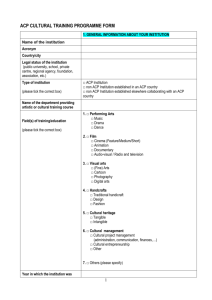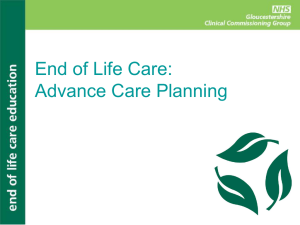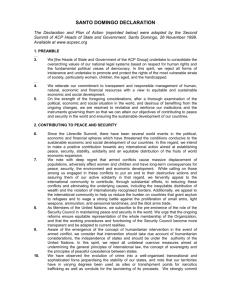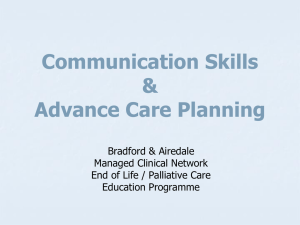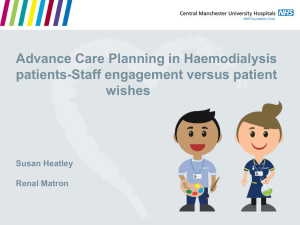McGOVERN Kevin
advertisement
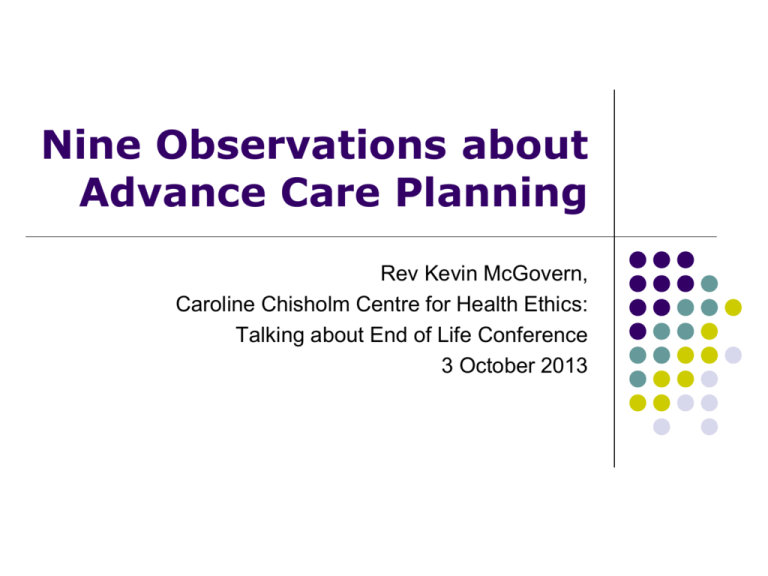
Nine Observations about Advance Care Planning Rev Kevin McGovern, Caroline Chisholm Centre for Health Ethics: Talking about End of Life Conference 3 October 2013 1. It’s a Revolution • • Advance Care Planning will bring about enormous changes in health care. Such revolutionary change is not easy: • • • for health professionals for health care institutions for patients, and their families & friends 1. It’s a Revolution (cont’d) • Advance Care Planning brings many benefits: • • • • • People expect their health professionals to help them decide about future care. Through ACP, we meet this expectation. ACP significantly increases patient satisfaction with their hospital stay. ACP significantly increases the percentage of patients whose EOL wishes are both known and followed. ACP significantly increases family satisfaction with the process of their loved one’s dying and death. If their loved one dies without ACP, 15-30% of family members experience significant stress, serious depression or severe anxiety. ACP greatly reduces all these negative reactions. 1. It’s a Revolution (cont’d) • It’s a Copernican Revolution: • Copernicus taught us that the sun does not revolve around the earth, but instead that the earth revolves around the sun. • ACP teaches us that patients/residents/care recipients should not have to revolve around their health professionals, but instead that we health professionals should revolve around them and around their values and wishes. 2. Facilitated Decision-Making Medical Consultation patient reports their symptoms health professional provides diagnosis, prognosis, and treatment options health professional facilitates the patient’s decision-making Advance Care Planning patient reports their state of health, their values and wishes health professional provides medical and other information health professional facilitates the patient’s decision-making 3. Conversations and Paper • Both facilitated decision-making and records of the conclusions from this are necessary for ACP. • There is a reductionistic tendency to reduce ACP to ‘ticka-box’ or ‘fill-in-a-form.’ (‘paper’) • The heart of ACP must be facilitated decision-making. (‘conversations’) • The reductionistic tendency must be resisted! 4. More about Paper Forms to appoint a Substitute Decision-Maker (SDM) e.g. VIC Enduring Power of Attorney (Medical Treatment) For this form, see http://www.publicadvocate.vic.gov.au /file/file/Powerofattorney/Power%20of%20attorney% 20forms%202010/Enduring_power_of_attorney_medical_t reatment_with_instructions2010.pdf Statutory Substitute Decision-Maker For VIC list, see http://www.publicadvocate.vic.gov.au/ medical-consent/175/ 4. More about Paper (cont’d) Recording values, wishes, treatment preferences and so on: note in medical record guiding or legally binding? forms tailored for specific diseases VIC Refusal of Treatment Certificate For this form, see http://www.health.vic.gov.au/__ data/assets/pdf_file/0004/275251/mta88_sched01.pdf lapses after current bout of illness → a new form must be completed next time 5. Realistic Goals for ACP Those in reasonable health 1. • • appoint Substitute Decision Maker (SDM) advise SDM of their values and wishes Those with a serious chronic disease 2. • • • • appoint Substitute Decision Maker (SDM ) advise SDM of their values and wishes advice about disease trajectory bucket list? 5. Realistic Goals for ACP (cont’d) No to the trigger questions: ‘Would I be surprised if this person died in the next 12 months?’ 3. • • • • • appoint Substitute Decision Maker (SDM ) advise SDM of their values and wishes advice about disease trajectory bucket list? recording treatment preferences, e.g. Advance Directive Death is imminent (e.g. 48-72 hours) 4. • • hopefully, all the plans are in place as the situation changes, new decisions may still have to be made 6. Challenges for Institutions • • easy to feel overwhelmed even so, slow and gradual progress is possible: • • • • • • • • written policies and procedures regular education and training information for patients/residents/community members appropriate forms record storage enabling easy access when needed are we able to communicate information to other institutions? audits, leading to continuous quality improvement ultimate aim is to embed ACP so it becomes standard practice 7. Cultural Competence National Health & Medical Research Council Cultural Competency in Health (2006), p. 7: “Cultural competence is a set of congruent behaviours, attitudes, and policies that come together in a system or among professionals and enable effective work in cross-cultural situations.” vitally important in Australian health care recognise diversity positively value diversity 8. Difference Blindness & Cultural Safety Cultural safety is “an environment that is safe for people: where there is no assault, challenge of denial of someone’s identity, of who they are and what they need.” Difference blindness = ‘we treat everyone the same.’ Difference blindness does not provide a place of cultural safety. It can be a threat to a person’s very identity. 9. Coming to Terms with Sickness, Dying and Death • Philip Gould’s When I Die • • “Intensity comes from knowing you will die and knowing you are dying…. Suddenly you can go for a walk in the park and have a moment of ecstasy…. I am having the closest relationships with all of my family…. I have had more moments of happiness in the last five months than in the last five years.” (p. 127-129) “I have no doubt that this pre-death period is the most important and potentially the most fulfilling and most inspirational time of my life.” (p. 143) 9. Coming to Terms with Sickness, Dying and Death (cont’d) • Henri Nouwen’s Our Greatest Gift • “I took his hand in mine and laid my other hand on his forehead; I looked into his tearful eyes and said: ‘Rick don’t be afraid, don’t be afraid…. Please trust that the time ahead of you will be the most important time of your life, not just for you, but for all of us whom you love and who love you.’ As I said these words, I felt his body relax, and a smile came through his tears. He said, ‘Thank you, thank you.’” (p. 60) 9. Coming to Terms with Sickness, Dying and Death (cont’d) • Michael Barbato’s Reflections of a Dying Sun: Healing experiences around death • • • Michael’s book records many significant things which happened as people became sick and as they were dying. “So yes a slow journey towards death is my preference….” “I would feel cheated if I died suddenly.”

